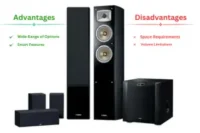Wired vs Wireless Keyboard: Ultimate Guide – Which One Should You Choose?
Published: September 10, 2025
Choosing the right keyboard isn’t as easy as it appears. One of the most common questions people ask today is whether they should buy a wired or wireless keyboard.
Before deciding, it’s also helpful to know about the different types of keyboards available in the market.
Both options have their advantages and disadvantages. Wired keyboards are known for their quick and dependable connections, whereas wireless keyboards provide more flexibility and a cleaner desk setup.
In this article, we’ll go over everything you need to know about wired vs wireless keyboards, from connection speed and battery life to comfort and security. Whether you’re a gamer, a writer, or simply looking for a comfortable typing experience, this article will help you make the best decision.
So, are you ready to find out which keyboard best suits you? Let’s dive in!
Connection & Latency
When we talk about keyboards, connection and latency are super important. Let’s break them down simply.
When we talk about keyboards, connection and latency are super important. Let’s break them down simply.
Wired keyboards: Have a direct cable connection (typically USB). This means they send signals directly to your computer, without any delay. Gamers and fast typists prefer wired keyboards because they provide instant response. You press a key, and it immediately works. There is no lag, no missed keystrokes.
Wireless keyboards: On the other hand, connect via Bluetooth or a USB receiver (also known as 2.4 GHz). Today’s wireless keyboards are much faster. Most people will not notice any delay when typing emails or working in the office.
However, if you play games in which every millisecond counts, a wired keyboard remains the best option. It gives you that extra advantage.
In short, if you want zero latency and a stable connection, go with wired. However, if you prefer a clean desk and don’t mind a little lag, wireless can be a great option.
Reliability & Power
Wired keyboards are extremely reliable. They receive power directly from your computer via the cable. You’ll never have to worry about your batteries running out or charging. This makes them ideal for extended work sessions, gaming marathons, or general office use.
Wireless Keyboards, however, require batteries or charging. Some require AA or AAA batteries, while others have built-in rechargeable batteries. If you forget to charge them, your keyboard may stop working at an inconvenient time.
However, many modern wireless keyboards now have extended battery life. Some can go weeks or even months on a single charge. Still, remember to check the battery level on a regular basis.
In short, if you want a keyboard that always works without worrying about power, go wired. However, if you don’t mind charging on occasion and want a cleaner desk, wireless can also work well.
Convenience & Mobility
Wired Keyboard: You must keep it close to your computer because of the cable. You can’t move it easily. The cable can make your desk look cluttered and limit where you can position your keyboard. If you prefer a simple setup and do not need to move your keyboard, wired is fine.
Wireless keyboard: You can set it anywhere on your desk or use it from your lap or couch. There are no cables to worry about, so your desk will remain clean and tidy. Many wireless keyboards can also connect to multiple devices, such as a laptop or tablet, allowing you to easily switch between them. It gives you more freedom and a clean workspace.
Security & Privacy
Wired keyboard: It is extremely secure because it uses a direct cable connection. Your typing data is sent directly to your computer and does not travel through the air. There is no chance of someone intercepting your signal. This makes wired keyboards a secure option for work that requires strict confidentiality, such as typing passwords or important documents.
Wireless keyboard: Connect via Bluetooth or a wireless receiver. This means that your typing signals travel through the air, and there is a small chance that someone will intercept them, particularly with older or less expensive models. Although newer wireless keyboards include better security features such as encryption, they may still be less secure than wired keyboards. If you work with sensitive data, always choose a model with strong security or stick to wired.
Use Case Scenarios
Wired keyboard: Excellent for gamers who require quick response and no lag. Also ideal for those who work long hours at a desk and require a dependable, always-on keyboard. If you type frequently and do not want to worry about batteries or charging, a wired keyboard is the best option.
Wireless keyboard: Ideal for those who prefer a clean, cable-free desk. Ideal if you frequently move your keyboard around or work from various locations, such as the couch or a meeting table. Also useful for students, office workers, and anyone who needs to connect to multiple devices quickly. Wireless is an excellent choice if you value flexibility and organization.
Cost Comparison
Here is a cost comparison of wired and wireless keyboards:
| Wired keyboard |
|---|
|
| Wireless keyboard |
|---|
|
Recent Tech Advancements
Technology keeps improving every year. Let’s see how both wired and wireless keyboards have become better over time.
Wired keyboard
- Improved cable quality for better durability
- Faster and more stable connections
- Some now include detachable cables for easier storage and replacement
Wireless keyboard
- Newer Bluetooth versions (like Bluetooth 5.0) give faster, more stable connections and longer range
- Better battery life — some last weeks or even months on one charge
- Multi-device pairing allows you to switch between your laptop, tablet, and phone easily
- Stronger security features to protect your data
Final Recommendation & Decision Guide
Before we wrap up, it’s useful to look at the overall pros and cons of keyboards to understand which option truly fits your needs.
Wired keyboard
- Best for gamers who need zero lag
- Great for people who type a lot and want a reliable, always-ready keyboard
- Good choice if you want to save money and avoid battery worries
Wireless keyboard
- Perfect for those who want a clean, cable-free desk
- Great for people who move around or use multiple devices
- Best for anyone who values flexibility and modern design over small delays
Conclusion
So, in this article, we’ve discussed the differences between wired and wireless keyboards in detail. After considering all of the pros and cons, I personally recommend going with a wireless keyboard if you prefer a clean, cable-free setup and require flexibility. However, if you are a gamer or someone who requires zero lag and maximum reliability, a wired keyboard is still the way to go. Ready to upgrade? Check out some of our top keyboard picks to see which one best suits your style!
Frequently Asked Questions [FAQs]
People often have many questions when deciding between wired and wireless keyboards, so here are clear answers to the most common ones:
Here are the disadvantages of wired keyboards:
- Limited mobility: You can’t easily move them around because of the cable.
- Messy desk: The wires can clutter your workspace.
- Port dependency: They use up a USB port on your computer.
Wired keyboards are usually better for gaming because they have zero lag and a faster response time. Many gamers trust wired connections for reliable performance during fast games. If you want the most accurate and quick reaction, go wired.
Wireless keyboards can have a slight delay, but most modern ones are very fast. For regular typing or office work, you won’t notice any lag at all. Only serious gamers or fast typists might feel a difference.
In general, wired keyboards are a bit cheaper because they don’t need extra parts like batteries or wireless receivers. They’re simple and budget-friendly. But prices can still vary based on brand and features.
Yes, many wireless keyboards have similar features like backlighting, media controls, and customizable keys. Some even offer extra functions through software. You don’t have to sacrifice features when going wireless.

- Be Respectful
- Stay Relevant
- Stay Positive
- True Feedback
- Encourage Discussion
- Avoid Spamming
- No Fake News
- Don't Copy-Paste
- No Personal Attacks

- Be Respectful
- Stay Relevant
- Stay Positive
- True Feedback
- Encourage Discussion
- Avoid Spamming
- No Fake News
- Don't Copy-Paste
- No Personal Attacks





